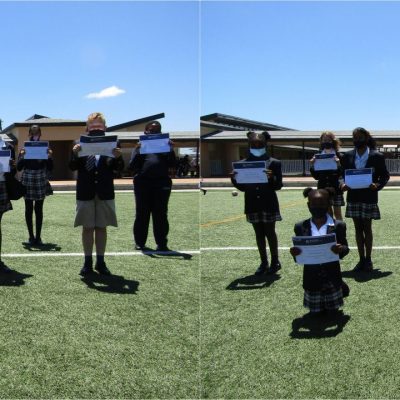
The Original Gangster Rapper
Young, intense, fickle love; arranged marriages; civil and parental disobedience; gangster warfare; silly jokes, nasty insults and suicide… these are all themes and issues the Year 7 and 8 students will be exploring in English this term. Sounds like some of the hot topics in the “no-good” music our youth listen to these days. Shocking? Nay, Shakespeare! The tragedy of Romeo and Juliet to be specific. Throw in a convoluted love square, a plot to kidnap a kid, some fairies and a magical flower and you have the comedic A Midsummer Night’s Dream too.
Oftentimes Shakespeare’s plays are viewed as stuffy, filled with “fancy” language and are considered unrelatable for modern audiences. When one realises that the language Shakespeare used was true to how everyday man spoke at the time and that he mixed formal and informal diction and structure to represent social status (and thus level of education), with colloquial language, slang and all of the drama that continues to plague mankind to this day, it becomes clear that the only barrier that truly sets Shakespeare’s work apart from us is our translation of Old English. Overcome this and we can appreciate the brilliance of Shakespeare’s plays in our world today and perhaps also develop an understanding of how language evolves.
When questions of modernity come to the fare, I enjoy emphasising that with rhyme, wit and themes that criticise and mimic society and mankind at large, drawing out every manner of emotions in the audience, Shakespeare’s poetry and plays are comparable to modern day “gangster rap”, gut-wrenching love songs or stories and creations of fantastical worlds in which we love to lose ourselves. Let’s not forget the thousands of words and phrases that first appeared in Shakespearean writings and are still made use of today.
Is Shakespeare irrelevant? Never! Shakespeare not only gives us a view into Elizabethan era society but forces into focus how much humanity has progressed in some ways and remained unchanged in others. The human condition seems to be eternal. When I asked students if they would allow their parents to choose their love interests, for example, they were in strong opposition to the idea and would rather choose to respectfully decline or flee – as epitomised in the characters of Juliet and Hermia. They seemed relieved at the fact that the patriarchy of the 16th and 17th century no longer holds as much weight in their world as it still does in many countries across the globe. They were also shocked and amused by how grungy Shakespeare can be in his diction chosen for many a comedic character. They expect that kind of language from their rap musician interests and controversial comedians or a movie their parents might be opposed to them watching. But from “Mr Fancy Pants” himself? Lo, how we misinterpret thee and thou for anything other than a casual ‘you’.
Considering topics of woe and misfortune, murder and the use of mind-altering magic as well as lingo one’s grandmother would threaten with soap, perhaps we should take Shakespeare out of the curriculum? How dare we putrefy young minds with 400-year-old madness? Surely however, if art imitates life, everything portrayed in Shakespearean plays is out there anyway and we cannot shelter our youth from what is thrown at them during a news report, in the lyrics of popular songs and a favoured game, television show or film? Indeed, man has not progressed far beyond many of these scourges since the bubonic plague hit London in the 15-1600’s. Shakespeare is thus certainly still relevant. Why else do we learn about history? Why else to we try to change governmental policies that seem to have been implemented in the stone ages and fight for our ever-changing human rights? Why do we learn to communicate with all manner of man, to explore and to grow in knowledge towards changed minds and hearts? In my opinion, what we can learn about ourselves from the works of a long-dead playwright, is far more beneficial than the darkness of humanity he reveals is scarring.
I asked my students about their opinions of Shakespeare this week and whether or not they think it should be kept in the yearly curriculum. There was definitely some strong opposition, with Year 8 students describing Shakespeare as dramatic, tedious, but entertaining, and acknowledgement that when one doesn’t understand the original text it is like reading Arabic. However, one student in Year 7B stated, with a chorus of agreement from his classmates, “I thought it was going to be boring, but now I am entertained,” and another chimed in, “The more I read, the more I want to read.” A few in 7A are intrigued and feel that Romeo and Juliet contains some of the best pick-up lines they have heard and are keeping note so that they might use them in future. Some of the Year 9 students who have studied a few of Shakespeare’s plays describe Shakespeare’s work as hallucinogenic, dark, tragic and, “Hectic! PG!”
Whatever one’s personal opinion on the matter of Shakespeare in the curriculum, along with his “low-down”, dark talk and tales, Shakespeare offers us gripping storylines, undeniably beautiful poetry, truer words than anyone else knows how to express, laughs and advice we would do well to heed.
“These violent delights have violent ends
And in their triumph die, like fire and powder
Which, as they kiss, consume.”“Wisely and slow; they stumble that run fast.”
Warnings by Friar Lawrence in Romeo and Juliet
“Do not swear by the moon, for she changes constantly. Then your love would also change.”
Juliet to Romeo – hints at the fickle nature of a young man’s love, epitomised by Romeo’s instantaneous switch from obsession over Roseline to Juliet.
“What’s in a name? That which we call a rose
By any other name would smell as sweet.”
Juliet, pondering the relevance of Romeo’s surname and standing as a Montague, her family’s (the Capulets’) sworn enemy.
“O serpent heart hid with a flowering face!
Did ever a dragon keep so fair a cave?
Beautiful tyrant, fiend angelical, dove feather raven, wolvish-ravening lamb! Despised substance of devinest show, just opposite to what thou justly seemest – A dammed saint, an honourable villain!”
Juliet describing Romeo after she finds out he has killed her cousin in a murderous, vengeful rage. A commentary on how appearances and behaviour can stand in contrast to one another and how despair can lead one to act out of character. This also displays Shakespeare’s love of oxymorons – contrast through contradiction.
A few special quotes from A Midsummer Night’s Dream:
“The course of true love never did run smooth.”
“Love looks not with the eyes, but with the mind,
And therefore is winged Cupid painted blind.”“Lord, what fools these mortals be!”
“And yet, to say the truth, reason and love keep little company together nowadays.”
A few great TEDx talks for those who love Shakespeare but not Hip Hop or visa-versa:
- Shakespeare was the First Gangster Hip-Hop Artist by Doug Rappaport – https://www.youtube.com/watch?v=iIojIWLnMiU
- ·Hip-Hop & Shakespeare? by Akala at TEDxAldeburgh https://www.youtube.com/watch?v=DSbtkLA3GrY
High School English Teacher



